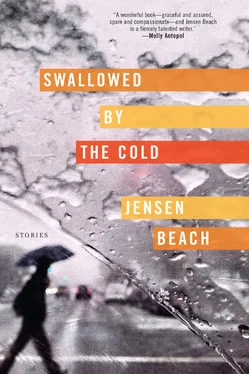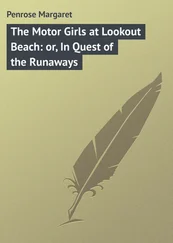“Once when I was little we went. I don’t remember any of it.” She dabbed at what was left of the tea with the towel. He looked away from this, pretended not to notice. That trip to Greece was the first time he’d seen a dead body. He was much older than Ingrid was, ten years at least. He felt himself starting to tell her about it, even though he knew he shouldn’t. It was like being slightly drunk at a dinner party and speaking too openly with someone he hardly knew, a feeling he knew well.
“My first day, I went to the beach at Kolympithres. It was crowded, and incredibly hot. You wouldn’t believe how hot. I had a hard time finding a place to lie down and was about to go back to my room when I saw a large group of people gathered at one end of the beach. I walked over to see why. The day before, a man at the hotel had told me about a dolphin that had beached itself earlier in the summer and died. I wondered whether something like that had happened again.”
The storm was passing, moving quickly inland. He knew this by the changing light in through the small window above the sink.
“As I got closer to the group of people,” he said, “I saw that there was a young woman lying in the sand. Her wet hair clung to her face and fanned out across the sand beneath her head. I understood right away that she’d drowned.” Ingrid sat rigidly in her chair, looking down at her hands on the table. He remembered the day so vividly. The crowd had stood around the body for a long time. He’d stayed there too, curious about what would happen, maybe a little curious to see how long he could stand it. Finally, someone picked up a towel from the sand nearby, shook it out, and covered the body. The towel didn’t reach the woman’s feet. It stopped midway down her calf. Her legs were tan and the bottoms of her feet were extremely white. “I’m sorry,” he said. “I shouldn’t have told you any of that. I’d only meant to tell you about my tennis days. Well.” Fredrik put the photograph down on the table. Its frame clapped loudly against the wood.
Ingrid, her body no less rigid, leaned into the table so that her chest met the edge. She said, “My mother drowned.”
“I know,” he said. “I didn’t mean to hurt your feelings.” The light coming in through the window had intensified, its lines sharper and the shadow between the refrigerator and the counter darker.
“We have to visit her grave and light a candle tonight,” she said.
“That’s a nice tradition,” he said. “When I’m in the city I do that for my mother, too.”
Later, after they’d finished their tea and she’d thanked him for the towel, he showed her to the door and watched as she stepped around a small puddle where the stones had receded to a shallow divot that was filled with water. At the end of the path, she turned to wave and he waved back. He kept his arm raised until she disappeared around the first bend in the road. The clouds were moving quickly and above the water the sky was clear.
The house was out of sight by the time she remembered the fish. The bag was still on the counter beside the refrigerator. She wasn’t far from the house and could go back easily, but the thought of doing so produced a tickle in her throat. She coughed twice into her hand and didn’t go back.
Her father was unloading the groceries from the trunk of the car when she came up the road to the house. He placed a bag in her arms. “When I called, the boys told me you’d gone,” her father said. “I kept an eye out for you on my drive home but I didn’t see you.”
“Here I am,” she said.
“They did a good job,” he said and pointed to the neatly stacked wood.
Her father prepared chicken for dinner, and they did not speak about her mother.
After dark, she and her father drove to the cemetery. Eskil and Einar stayed at home. In the car, her father said he was too tired to fight with them. The church parking lot was full of cars and the only available spot was in the center of a large puddle. Her father let her out before he parked. She watched the car ease into the puddle, water lifting and cresting away from the tires. The red brake lights were reflected in the black water. Her father opened the door and stepped, first a long, slow step and then two quick steps out of the water, to the muddy gravel of the parking lot.
She followed her father to the grave. The grass was wet and slippery and the paths were pocked with footprints. It was silent apart from the wind and the footfalls of other visitors.
Her father read her mother’s name aloud from the headstone. He started to say the dates of birth and death but stopped before he’d finished. She could tell he didn’t know what to do.
“Say a prayer,” she said.
He began to recite the Lord’s Prayer but stopped after the first few lines. “I don’t know the rest,” he said. “I thought it’d come to me but it didn’t.”
They stood at the grave for a long time. She carefully relit the candle when it extinguished in a gust. It was late and the wind that earlier cleared the sky brought the biting cold air off the water. Her father put his arm around her and pulled her to him, briskly rubbing his hand over her shoulder. “She was a good mother,” he said, “and a good wife. We miss you.” He reached out and touched the top of the headstone with his fingertips.
The crisp reflections of the trees and the candlelight and her and her father’s legs shook in the rippling puddles. They walked quickly back to the car. The wind was at their backs.
They joined the line of cars leaving the parking lot. The windows had fogged and through the palled glass she watched the red brake lights ahead extinguish and light again as the cars edged forward.
The drive was short but felt long. Not far from the church, the road reached the water and followed the coastline nearly all the way to their house. Ingrid watched the water, the steady pattern of whitecaps moving toward land. When they reached the house, her father turned into their drive. The headlights illuminated a shape on the front step. She knew what it was. Though she’d done nothing wrong and might easily explain the afternoon, she hurried to reach the bag before her father could. She heard his footsteps behind her. “Ingrid,” he said, “what’s wrong?”
She took the bag from the step and moved into the porch light to look more closely. Fredrik had folded a small yellow piece of paper in half and stapled it to the bag. She opened the paper and saw that he’d written, in small letters, her name. “What is that?” her father asked. He reached for the bag, but she turned away from him.
“Fish,” she said. “It’s fish.” She heard the water in the shallow inlet opposite the house. Rolf Strand’s boat was still moored there with a rusty spring line to a moss-covered rock. The boat pulled against the line, bumped back into the rock, pulled against the line again. She listened to this rhythm. She heard her father’s voice speaking to her and the voices of her brothers inside coming closer to the door. The voices and the hollow thumping of the empty boat against the rock were the gathered crowd and Ingrid was the drowned girl. She felt the sand on her back and the wind on her tender white feet. She looked down the dark road. The tall thin birches swallowed it whole in the windy night. From out of the darkness she saw him, young, two-armed, sunburned, and handsome, approaching.
From the bottom of a shallow ditch, Henrik needed help. From inside his car at the bottom of the shallow ditch beside the southbound lane, he needed help. From where he was seat-belted to the driver’s seat of his upside-down Volvo, he needed help. It was late, and Jenny was driving south, listening to a radio documentary about North Korea. She saw the cast of bright headlights out of the shallow ditch. She saw a ghostly cloud rising from the shallow ditch. Up the road, she saw in the wash of her own headlights tire marks disappearing into the shallow ditch. Henrik’s phone was in his computer bag in the backseat of the car. His phone was in his computer bag on the ceiling of the upturned car. His phone was unreachable because his arm was pinned between his body and the crumpled door. He needed help for the injuries to his body. He needed help for his broken arm, for his cracked pelvis, for his crushed ribs, for his shattered jaw. He needed help for a broken finger. In his mind, he visited a warm and sunny beach. He remembered the sound of the pages of his wife Lisa’s magazine in the wind. He thought he heard a car come to a stop on the shoulder above him. He thought he heard a car come to a stop on the shoulder above him and a car door slam shut and the dry rain of rocks falling into the shallow ditch. His eyes were open. The gravel avalanched beneath her. What if a child was in the car? What if an injured child was in the car? What if a dead child was in the car? He thought he heard someone calling out to him, though he did not hear his name. It was July but already there was steam from the exhaust. He thought he saw a deer. He thought he saw a deer and swerved to avoid it. He thought he saw a deer peering in at him from outside. Jenny was not a deer. She was here to help. She said something from the dark outside. There was no child in the car. There was only a man in the car. There was blood painted onto the cracked window glass. A pair of legs was in the light. A pair of legs took two steps closer. A pair of legs became a single leg beyond the dented frame of the shattered windshield. “Are you alive?” asked Jenny. “Can you hear me?” she said. Henrik’s body was failing. His body was frightening. His body was a body. He wanted to know if he had died. He wanted to know what he did to deserve this. But he knew this is what had been waiting.
Читать дальше











